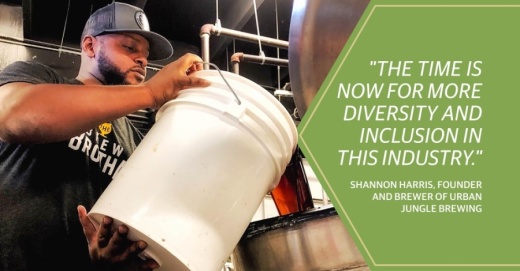Harris, alongside his wife and business partner Tiana, recently launched a crowdfunding campaign to raise money to open Urban Jungle Brewing. Since the Kickstarter campaign began in early August, they have managed to collect more than $26,000 in donations.
Depending on where Urban Jungle lands a site for its operations—Harris said he has had discussions with the cities of Austin, Hutto, Leander and Georgetown—the brewery may be either a farmhouse-style brewery akin to Southwest Austin’s Jester King or a brick-and-mortar site outfitted to have a rural feel. For a brick-and-mortar location, Harris said he believes he can open the brewery as soon as summer 2022.
But wherever Urban Jungle ultimately finds a home, Harris will become the Austin area’s first Black owner of a brewery. In Texas, a state with an ever-increasing number of new taphouses, Urban Jungle would be one of less than a handful of Black-owned breweries.
“Austin beer is a white male-dominated industry. That’s just how things worked out,” Harris said. “For me to create a platform and assist other Black brewers, I would love to be a part of that.”
Bringing global experience to Austin
Though he is yet to have a brewery with his own name on it, Harris has already professionally produced beer in the Austin area.
Harris has years of homebrewing experience under his belt, including gold medals from local, state and national homebrewing competitions. But the local craft beer enthusiast has also worked as a “contract brewer,” meaning he has been invited into breweries to make his own recipes using their tank systems.
“The very first brewery I was able to work with was Red Horn [Coffee House & Brewing Co.] up in Cedar Park. They were the first brewery I met when I moved here,” Harris said.
In the time since, Harris has been invited to collaborate with breweries across the world. The Pflugerville resident has traveled south of the border to make recipes with Mexican breweries and traveled to South Africa to learn how to brew with the yeasts, hops and grains of the African continent. As part of Pittsburgh’s Fresh Fest Beer Fest—the nation’s first festival to feature Black-owned breweries—Harris linked up with Irish giant Guinness to collaborate on an India pale ale.
“Being able to brew in other countries was something that really piqued my mind to be more of an experimental brewer,” Harris said.
At Urban Jungle, Harris said he plans to produce hazy milkshake IPAs and “pastry stouts,” which are brewed with confections such as rice crispy treats or cinnamon buns that will be made by hand and on-site at the brewery’s own bakery.
A taproom for everyone
While the Harrises hold a grand vision for their brewery’s potential—with enough land, the horse-riding enthusiasts would like to incorporate a horse rescue—the brewing couple are driven first and foremost to make Urban Jungle a welcoming home for minority groups often left out of the craft beer industry.
“I can't tell you how many festivals or taprooms I’ve been to where I was the only Black person there,” Harris said. “Diversity and inclusion is a big factor of mine. It’s not just strictly Black people or other people of color. ... Inclusion means the LGBTQ+ community, as well as Indigenous people and women.”
Nationwide, the craft beer industry is grappling with a lack of diversity. According to the national trade group the Brewers Association, there were more than 8,000 breweries across the U.S. in 2019, and with a little more than 60 Black-owned breweries among that bunch, Black brewers account for less than 1% of all owners.
Of the 341 breweries operating in Texas in 2019, just two are operated by Black owners, and none of them are in Austin.
In the midst of nationwide protests against racial injustice and police brutality, spurred by the deaths of George Floyd and Breonna Taylor, San Antonio brewery Weathered Souls launched a collaborative movement with other breweries nationwide to raise funds for social justice groups. The collaboration, called Black is Beautiful, has so far drawn in efforts from 1,130 breweries in 50 states nationally and 21 countries worldwide, including 113 in Texas alone.
Harris was one of those collaborators, joining efforts with Red Horn to create an imperial stout with coffee, cinnamon and vanilla that was released in late July and making another collaborative effort with Houston's Urban South Brewery.
Urban Jungle’s own fundraising campaign will donate to local racial justice groups such as the Austin Justice Coalition or the local chapter of the NAACP, Harris said.
“We’d like to take a portion and donate it to a local organization in Austin that continues to fight racial injustice,” Harris said. “You will be making an impact locally.”
If the brewery’s crowdfunding goal of $60,000 is met by the campaign’s Sept. 6 deadline, Harris said Urban Jungle will further use the funds to pay for licensing fees, permits and applications, and marketing.
Since the Harrises launched their Kickstarter campaign, the couple have attracted the attention of local media and craft beer groups. The garnered attention led to the city of Austin reaching out to Harris about a potential site, the local brewer told Community Impact Newspaper.
While Harris continues to look at Austin’s northern suburbs for farmland that would satisfy the needs of a potential farmhouse-style brewery, he said a site in North Austin—adjacent to the Domain and the upcoming Austin FC stadium—would be a “prime opportunity.”
“Being close to the Domain would give us an avenue to reach out to locals and also tourists,” Harris said. “If I did get within Austin, that’s exactly where I would like to be.”
Regardless of where Urban Jungle plants its roots—whether it be Austin, Hutto, Leander, Georgetown or farther out in the stretches of Williamson County—Harris said the ultimate goal of creating an inclusive space for everyone will remain the brewery’s top priority.
“With the community support, I want to be that new brewery in town that welcomes all walks of life,” Harris said. “The time is now for more diversity and inclusion for this industry.”





